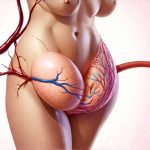Premenstrual Syndrome (PMS) affects a significant portion of menstruating individuals, manifesting as a constellation of physical, emotional, and behavioral symptoms that occur in the luteal phase of the menstrual cycle – the time between ovulation and menstruation. While often dismissed as an unavoidable part of being female, PMS is increasingly understood to be far more complex than simply ‘hormonal mood swings’. Traditional approaches have largely focused on managing symptoms after they arise, but a growing body of research suggests that the foundation for emotional resilience during PMS may lie within our gut – specifically, the intricate relationship between the gut microbiome and neuroendocrine function. This connection is not merely correlational; it’s deeply interwoven, impacting everything from neurotransmitter production to inflammation levels, both of which play crucial roles in how we experience premenstrual emotional changes.
The cyclical hormonal fluctuations inherent to the menstrual cycle are undoubtedly a key driver of PMS symptoms, but they don’t operate in isolation. These hormones interact with our nervous system and immune function, and this interaction is heavily influenced by the state of our gut microbiome. A diverse and thriving gut microbiome can positively modulate these systems, potentially buffering against the more challenging emotional aspects of PMS. Conversely, imbalances within the gut – known as dysbiosis – can exacerbate inflammation, disrupt hormonal regulation, and negatively impact neurotransmitter production, leading to increased anxiety, irritability, mood swings, and even depression during the premenstrual phase. Understanding this bidirectional relationship is crucial for developing proactive strategies to support emotional wellbeing throughout the menstrual cycle. Is there a connection between gut health and anxiety can significantly impact these cycles.
The Gut-Brain Axis & Hormonal Influence During PMS
The gut-brain axis (GBA) represents a complex communication network connecting the gastrointestinal tract, the brain, and the endocrine system. This isn’t just a one-way street; it’s a dynamic, two-way dialogue facilitated by several pathways including the vagus nerve, the immune system, and the production of neurotransmitters. The gut microbiome plays a central role in this axis, influencing both the physical structure and functional capacity of these communication channels. During PMS, hormonal shifts – particularly fluctuations in estrogen and progesterone – directly impact the GBA. Estrogen, for instance, can alter gut permeability (“leaky gut”), potentially allowing inflammatory molecules to enter the bloodstream. Progesterone affects gut motility, sometimes leading to constipation or bloating – common PMS symptoms that further contribute to microbiome imbalances.
These hormonal changes don’t just affect the physical gut; they also influence brain function. Estrogen and progesterone modulate neurotransmitter systems involved in mood regulation, such as serotonin and GABA. Importantly, a significant portion of serotonin (often referred to as the “happy hormone”) is actually produced in the gut by our microbiome. A compromised gut microbiome may therefore lead to reduced serotonin production, contributing to low mood and increased vulnerability to emotional distress during PMS. The influence isn’t limited to serotonin; dopamine and GABA – both critical for emotional regulation – are also impacted by gut health.
Furthermore, inflammation is a key factor in many PMS symptoms. Hormonal fluctuations can trigger an inflammatory response, and the gut microbiome plays a vital role in regulating this process. A dysbiotic gut tends to be more pro-inflammatory, meaning it promotes increased levels of inflammatory cytokines. This chronic low-grade inflammation can exacerbate emotional symptoms like irritability, anxiety, and depression. A healthy gut microbiome acts as a buffer against these inflammatory processes, helping to maintain emotional stability even during the hormonal rollercoaster of PMS. The connection between gut health and allergies can play a role in inflammation levels.
The Role of Inflammation in Premenstrual Emotional Symptoms
Inflammation isn’t simply a sign of physical injury or infection; it’s an integral part of the body’s immune response. However, chronic low-grade inflammation – often driven by factors like diet, stress, and gut dysbiosis – can have far-reaching effects on mental health. During PMS, hormonal changes heighten inflammatory processes, making individuals with pre-existing gut imbalances particularly vulnerable to emotional distress. Inflammatory cytokines released during this period can directly impact brain function, disrupting neurotransmitter balance and affecting areas of the brain involved in mood regulation, such as the amygdala (responsible for processing emotions) and the hippocampus (involved in memory and learning).
Specifically, inflammatory molecules have been linked to increased levels of cortisol – the stress hormone. While cortisol is essential for responding to acute stressors, chronically elevated cortisol can lead to anxiety, irritability, and difficulty concentrating. The gut microbiome plays a crucial role in modulating the hypothalamic-pituitary-adrenal (HPA) axis – the body’s central stress response system. A healthy gut microbiome can help regulate HPA axis activity, preventing excessive cortisol release. Conversely, dysbiosis can exacerbate HPA axis dysfunction, leading to chronic stress and heightened emotional reactivity during PMS. Exploring the link between gut pain and emotional triggers is essential for understanding this interplay.
Addressing inflammation isn’t just about taking anti-inflammatory supplements (although these can be helpful in some cases). It’s about cultivating a gut microbiome that naturally dampens inflammatory responses. This is achieved through dietary changes, stress management techniques, and lifestyle modifications aimed at restoring gut health. A diet rich in fiber, prebiotics, and probiotics supports microbial diversity and reduces inflammation, while minimizing processed foods, sugar, and unhealthy fats helps to prevent its escalation.
Dietary Strategies for Gut Health & Emotional Wellbeing During PMS
Diet is arguably the most powerful tool we have for influencing our gut microbiome. The food we eat directly feeds the microbes in our gut, determining which ones thrive and which ones struggle. During PMS, prioritizing a gut-supportive diet can significantly mitigate emotional symptoms. This doesn’t necessarily mean restrictive dieting; it’s about making informed choices that nourish both your body and your microbiome.
Here are some key dietary strategies:
- Increase Fiber Intake: Fiber acts as food for beneficial gut bacteria, promoting their growth and diversity. Aim for at least 25-30 grams of fiber per day from sources like fruits, vegetables, whole grains, legumes, and nuts.
- Incorporate Fermented Foods: Fermented foods like yogurt (with live cultures), kefir, sauerkraut, kimchi, and kombucha are naturally rich in probiotics – beneficial bacteria that can help restore gut balance.
- Consume Prebiotic-Rich Foods: Prebiotics are types of fiber that specifically feed beneficial gut bacteria. Good sources include onions, garlic, leeks, asparagus, bananas, oats, and apples.
- Limit Sugar & Processed Foods: Sugary foods and processed foods can promote the growth of harmful bacteria in the gut, contributing to inflammation and dysbiosis.
- Hydrate Adequately: Water is essential for optimal digestion and gut health.
Beyond specific food choices, mindful eating can also play a role. Paying attention to how your body responds to different foods and avoiding emotional eating are crucial steps in cultivating a healthier relationship with food and supporting your gut microbiome. Dietary changes aren’t about deprivation; they’re about nourishing yourself from the inside out. Gut biofilm can impact nutrient absorption during these dietary shifts.
Lifestyle Factors Beyond Diet
While diet is paramount, other lifestyle factors significantly impact both gut health and emotional regulation during PMS. Stress management is arguably one of the most crucial aspects. Chronic stress can disrupt the GBA, leading to imbalances in the microbiome and exacerbating inflammation. Techniques like meditation, yoga, deep breathing exercises, spending time in nature, or engaging in hobbies you enjoy can help mitigate the effects of stress.
Sleep quality also plays a vital role. Insufficient sleep disrupts hormone balance, impairs immune function, and negatively impacts gut health. Aim for 7-9 hours of quality sleep per night to support both physical and emotional wellbeing. Regular exercise is another important factor. Exercise has been shown to improve mood, reduce stress, and enhance gut microbiome diversity. However, overexercise can be stressful on the body, so finding a balance that works for you is key.
Finally, consider your exposure to environmental toxins. Certain chemicals in cleaning products, personal care items, and food packaging can disrupt the gut microbiome and contribute to inflammation. Opting for natural and organic alternatives whenever possible can help minimize exposure to these harmful substances. A holistic approach to health – one that encompasses diet, stress management, sleep, exercise, and minimizing toxin exposure – is essential for supporting emotional resilience during PMS. Gut health impacts overall wellbeing, extending beyond PMS symptoms. Understanding overtraining’s impact is also important for a balanced lifestyle. Finally, consider how liver health plays into hormonal balance and PMS symptoms.


















